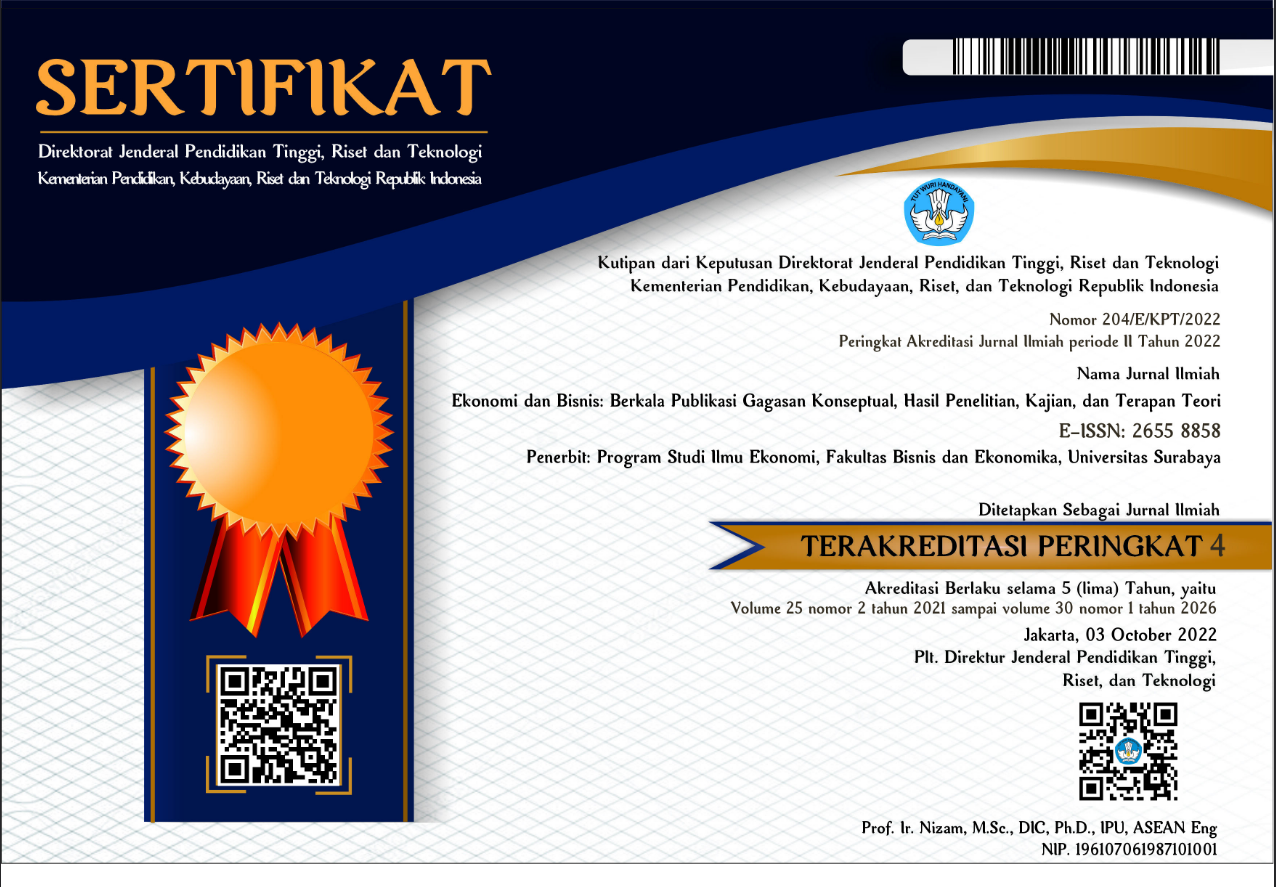FAKTOR-FAKTOR YANG MEMPENGARUHI EKSPOR NON-MIGAS PRODUK TEKNOLOGI TINGGI
 Abstract Views:
357 times
Abstract Views:
357 times
 PDF Downloads:
255 times
PDF Downloads:
255 times
Abstract
This study aimed to examine the influenceof some factors such as Research and Development (R&D), Patens, Labor Force, and Term of Trade Toward Non-Oil Exports of high technology products. This research is explanatory research use quantitative approach. Research data uses the report of the research in six ASEAN countries which are Indonesia, Malaysia, Singapore, Thailand, Vietnam, and Philippines which are gotten from World Bank and World Intellectual Property Organization (WIPO) site starting from 2000 to 2014. The tabulation of data in this research uses several methods of data analysis of regression model which are Common Effect model, Fixed Effect model, and Random Effect model. Then, it is done to elect the best models use redundant fixedeffect test and Hausman test. The result of this research in hypothesis test shows that the variable has positive influenceand significancetoward Non-Oil Exports of high technology products. The positive influenceand significanceare R&D and Term of Trade. However, patens variables showed significantresults with negative influences.While the variable Labor Intensive shows the results are not positive and significantimpact directly against the non-oil exports of high technology products in the six countries which is researched. From the research it is known, produces determinant coefficientin the amount of 95.15%, which means that the variables used in this research has a major influenceon the Non-Oil Exports of high technology products.
Downloads
References
Amighini, A., & Sanfilippo,M. (2014). Impact of South–South FDI and Trade on the Export Upgrading of African Economies. World Development, Volume 64, 1–17.
Badri, A. K., Yahyavi, R., & Pourebrahim, M. (2015). Examining the Effects of R&D and Human Capital on Export of Iran. Resistive Economics International Journal, Volume 3 (4), No. 7, 100-115.
Gujarati, D.N. (2012). Dasar-dasar Ekonometrika, Terjemahan Mangunsong, R.C. (Edisi kelima). Jakarta: Salemba Empat
Hasanov, Z., Abada, O., & Aktamov, S. (2015). Impact of innovativeness of the country on export performance: evidence from Asian countries. IOSR Journal of Business and Management, Volume 17 (1) e-ISSN: 2278-487X, p-ISSN: 2319-7668, 33-41.
Hunt, R. M., & Nakamura, L. I. (2007). The Democratization of U.S. Research and Development after 1980. Society for Economic Dynamics Marina Azzimonti Department of Economics Stonybrook.
IMF, CEIC. (2014). Building on Asia’s Strengths during Turbulent Times, from http://imf.org/external/pubs/reo/2014/apd/eng/pdf/areo0516.pdf
Singarimbun, M., & Efendy, S. (2006). Metode Penelitian Survei. Jakarta: LP3ES.
Widarjono, A. (2009). Ekonometri Teori dan Aplikasi untuk Ekonomi dan Bisnis (Edisi Kedua). Yogyakarta: Ekonisia.
World Bank. (2015). Retrieved Information Administration and World Development Indicator: http://databank.worldbank.org/data/download/ WDI-2013-ebook.pdf
World Bank. (2016). Retrieved from web.worldbank.org.

 DOI:
DOI:















